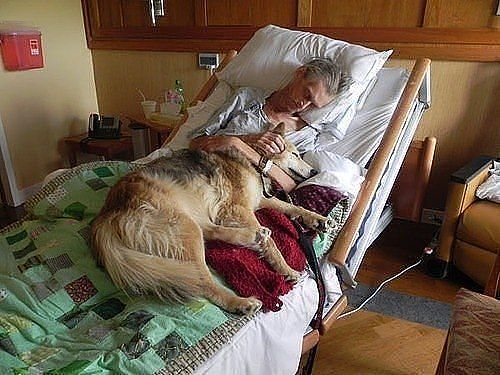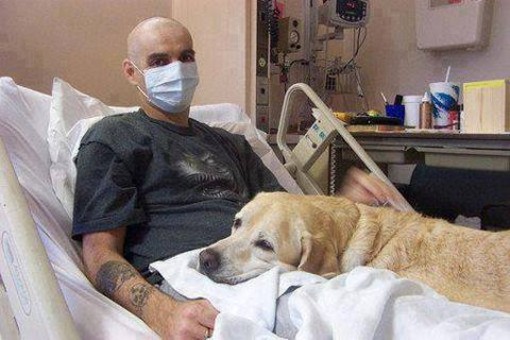
Credit: mdiary.ru
There’s very little that’s as heartbreaking as knowing a dying person is about to lose their beloved pets. Yet this very often happens when a person becomes too ill to care for their animals and there is no one around to pick up the slack. Even when caregivers are available, they are often overwhelmed with the needs of their human charge. Fixing meals, arranging appointments, and tending to the needs of their loved one leaves no time or energy for walking and feeding a dog. And so companion animals that provided comfort and connection to a dying person for years are often sent away. Some are even euthanized.
But now there’s some respite for the dying and their pets. An organization called Pet Peace of Mind is working with hospice and palliative care organizations across the United States to help these beloved pets stay in their homes. Founded by Dianne McGill, an animal advocate from Salem, Oregon, the program currently partners with 120 organizations in 40 states.
Caring for Pets When the Owner Can’t
McGill saw the need for a service like Pet Peace of Mind 10 years ago, she says in an interview with Next Avenue. She was working for an animal welfare group, and a friend reached out for help. A dying relative desperately wanted to continue living with her cats and to make some arrangements to have them taken care of after her death. But no one was willing to take them, and her son was going to have them euthanized.
McGill called several hospices and learned that the woman’s plight was a very common one. At the time, there was no organization that could step in and assist.
Soon after, McGill started Pet Peace of Mind as a small pilot program in Oklahoma. Today it is a registered 501(c)(3) organization with partners nationwide.
Staffed by Volunteers

Dianne McGill
Credit: petpaceofmind.org
McGill runs the program from her office in Oregon. But nonprofit hospices and local volunteers do most of the work. For example, Terri Roberts, director of volunteer services at Columbus Hospice of Georgia & Alabama, tells the story of a pet owner who had to go to a nursing home that would not accept pets. So her hospice found a volunteer who adopted the dog and took her for weekly visits to see the owner until she died.
In other cases, volunteers have provided help with things like dog walking, cleaning cat boxes, and taking pets to the vet. When money has been an issue, they have also provided food. “We have patients getting Meals on Wheels who are giving most of their food to their animals,” Roberts said. Pet Peace of Mind volunteers help ensure that needy patients and their families don’t have to make that choice.
Backed by Science
Human beings have intuitively understood the benefits of interacting with animals for centuries. But today there’s also a wealth of scientific research that shows human-animal interactions create physiological changes that affect us physically and psychologically. According to the Human Animal Bond Research Institute, these include the release of the powerful “bonding” chemical oxytocin in the brain. Scientists associate oxytocin release with feelings of comfort, socialization and stress relief.

Credit: today.it
People who interact regularly with animals also tend to have lower blood pressure and heart rates, less anxiety and lower levels of the stress hormone cortisol than those who don’t.
If you know someone who is struggling to care for one or more pets while dealing with a life-limiting illness, visit Pet Peace of Mind. The website offers an interactive map that lists partner organizations across the United States and a list of other programs and resources that may be able to help.
No one should be separated from their beloved pets when they’re approaching the end of life. Nor should an animal miss out on those last precious moments because no one has the resources to help.

 Dying Pet Owners Get Help from Pet Peace of Mind
Dying Pet Owners Get Help from Pet Peace of Mind



 How to Comfort A Dying Loved One
How to Comfort A Dying Loved One
 Our Annual Seven Holiday Gifts for Someone Who Is Grieving, 2024 Edition
Our Annual Seven Holiday Gifts for Someone Who Is Grieving, 2024 Edition














